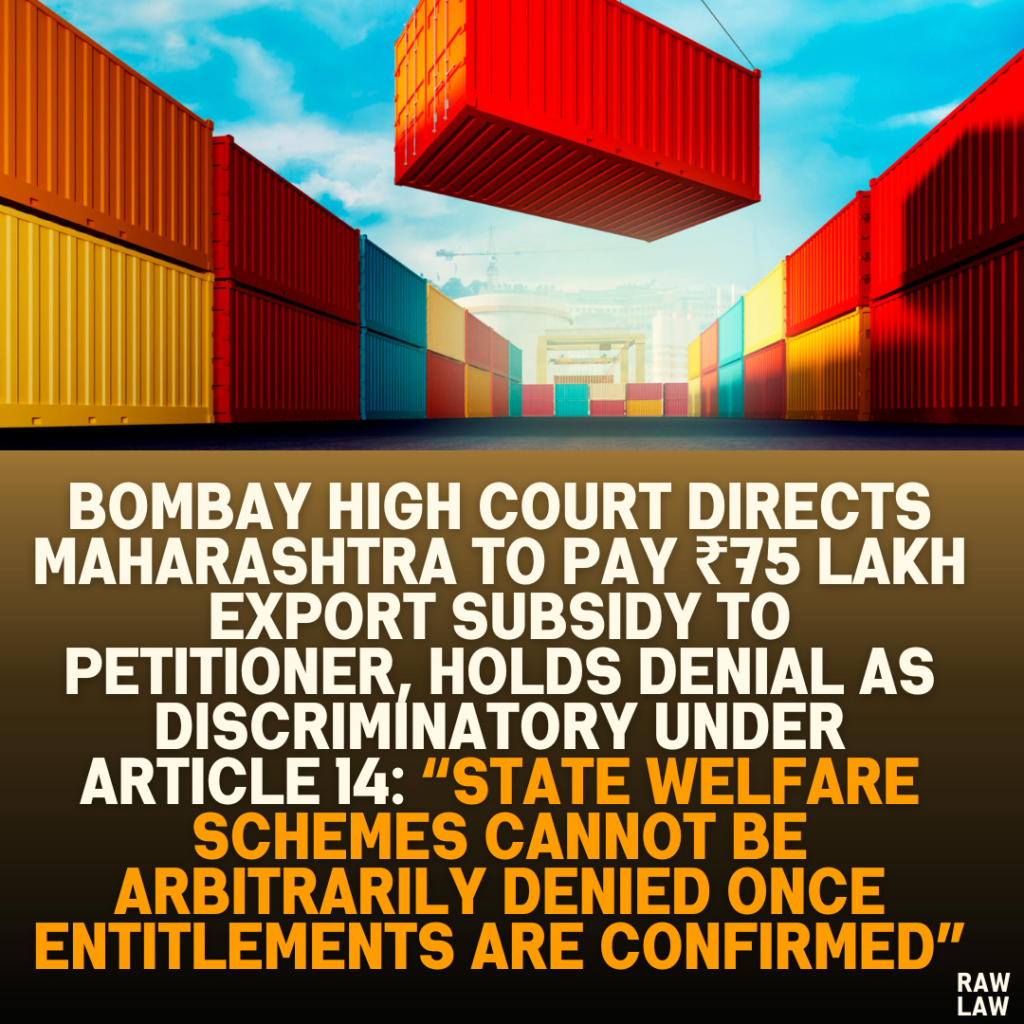Court’s Decision
The Bombay High Court directed the State of Maharashtra to pay the petitioner ₹75,00,000 as an export subsidy under the Government Resolution (GR) dated July 31, 2018. The court held that the refusal to pay the subsidy despite previous confirmations and orders violated the petitioner’s constitutional right under Article 14, which ensures equality before the law. The court clarified that similarly placed entities had already received the subsidy, and denying the petitioner the same benefit was discriminatory.
Facts
- Background of the Scheme:
- In 2018, the State of Maharashtra faced an excess stock of milk powder due to a fall in its demand, which created financial distress for milk manufacturers and farmers.
- To mitigate this, the State introduced a subsidy scheme through a GR dated July 31, 2018, offering ₹50 per kg of exported milk powder.
- Petitioner’s Compliance:
- The petitioner exported 150 metric tons of milk powder between December 2018 and January 2019, claiming a subsidy of ₹75,00,000 under the scheme.
- Their claim was supported by official inspections, a detailed government order dated March 4, 2022, and a report dated May 26, 2022, confirming their entitlement.
- Failure to Disburse the Subsidy:
- Despite multiple representations and legal confirmations, the respondents refused to release the subsidy, prompting the petitioner to approach the court.
Issues
- Whether the petitioner was entitled to the export subsidy under the GR dated July 31, 2018.
- Whether the refusal to disburse the subsidy violated Article 14 of the Constitution.
- Whether procedural lapses, as alleged by the respondents, invalidated the petitioner’s claim.
- Whether granting the subsidy to the petitioner amounted to providing a “double benefit.”
Petitioner’s Arguments
- Entitlement Confirmed by the State:
- The petitioner emphasized that their eligibility and the subsidy amount had been officially confirmed by administrative orders and inspection reports.
- Violation of Article 14:
- They argued that similarly placed entities had received the subsidy, and denying it to them constituted discrimination under Article 14 of the Constitution.
- Legitimate Expectations:
- The petitioner claimed they relied on the promises of the government in exporting milk powder at lower prices, suffering financial losses in anticipation of the subsidy.
- Procedural Lapses Irrelevant:
- They argued that the GR was valid and procedural lapses alleged by the respondents could not negate their entitlement.
Respondent’s Arguments
- Procedural Invalidity:
- The respondents contended that the GR dated July 31, 2018, was issued without necessary approval from the Finance Department, as required under Article 166(3) of the Constitution and the Maharashtra Rules of Business.
- Risk of Double Benefit:
- They argued that the petitioner might receive a double benefit, having already availed subsidies under a separate GR dated May 10, 2018.
- No Parity with Other Beneficiaries:
- The respondents claimed that payments to similarly placed entities were made in error and could not justify the petitioner’s claim.
Analysis of the Law
- Validity of the GR:
- The court held that the GR dated July 31, 2018, was validly issued and formed the basis of the petitioner’s claim. Procedural objections by the respondents could not override valid administrative decisions.
- Article 14 and Equality:
- The court underscored the principle of equality, ruling that denying the petitioner the subsidy while granting it to others in similar circumstances violated Article 14.
- No Double Benefit:
- The court clarified that the schemes under the GR dated May 10, 2018, and the GR dated July 31, 2018, were distinct and independent, and no overlap or “double benefit” occurred.
- Mandatory Nature of Rules of Business:
- The court acknowledged the mandatory nature of Rules of Business under Article 166(3) but emphasized that these rules did not affect the petitioner’s entitlement once the GR was issued and acted upon.
Precedent Analysis
- Indapur Dairy Case:
- The court referred to its previous orders directing the payment of the subsidy to Indapur Dairy under identical circumstances, observing that the petitioner was entitled to the same treatment.
- Supreme Court Judgments:
- The respondents cited Haridwarsingh v. Bagun Sumbrui and MRF Ltd. v. Manohar Parrikar, which upheld the mandatory nature of Rules of Business.
- However, the court distinguished these cases, ruling that the petitioner’s claim was valid and involved no procedural violations or illegality.
- No Negative Equality:
- The court rejected the argument that granting the subsidy would perpetuate illegality, holding that no illegality existed in granting the benefit to similarly situated entities.
Court’s Reasoning
- Binding Nature of Prior Orders:
- The court emphasized that previous orders confirming the petitioner’s entitlement were valid and binding until challenged or set aside.
- State Largesse and Welfare:
- It observed that the subsidy scheme was a welfare measure intended to support milk manufacturers and farmers and could not be withheld arbitrarily.
- Role of Finance Department:
- The court dismissed the Finance Department’s objections, stating that it lacked authority to overturn administrative decisions and court orders.
Conclusion
- The court directed the respondents to release ₹75,00,000 to the petitioner within six weeks.
- It allowed the petitioner to pursue their claim for interest in separate proceedings.
- The court refrained from imposing costs due to the circumstances of the case.
Implications
- Strengthens Judicial Oversight:
- The judgment reinforces the judiciary’s role in ensuring compliance with welfare schemes and safeguarding constitutional rights.
- Limits Arbitrary State Action:
- It underscores that administrative lapses or objections cannot deprive citizens of benefits once entitlements are confirmed.
- Clarifies Article 14 Protections:
- The case affirms that similarly situated individuals or entities must be treated equally in matters of state largesse.



